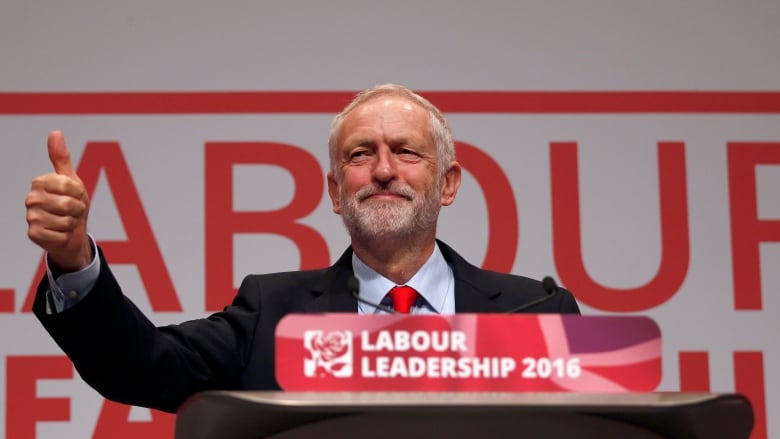Jeremy Corbyn re-elected leader of divided U.K. Labour Party
MPs passed a no-confidence motion against Corbyn after Brexit

Veteran socialist Jeremy Corbyn was re-elected head of Britain's Labour Party on Saturday, defeating a challenge to his year-old leadership, to the delight of his grass-roots supporters and the despair of party centrists, who fear he will lead Labour into the political wilderness.
Corbyn, who faced a no-confidence vote from his MPs earlier this year, won almost 62 per cent of the more than 500,000 votes cast by Labour members and supporters. His challenger, Welsh lawmaker Owen Smith, got 38 per cent in a result announced at the party's conference in Liverpool, northwest England.
Corbyn, a longtime backbench lawmaker, was elected last year to lead Labour, which governed between 1997 and 2010 but has lost two successive general elections to the Conservatives.
He has strong support among local party activists, but many Labour legislators believe his left-wing views are out of step with public opinion, and have tried to unseat him.
Accepting victory to a standing ovation from delegates, Corbyn said he would work to unite the party.
- Analysis | Labour's identity crisis will come to the fore at leadership vote this weekend
- Brexit result sparks revolt against U.K. Labour Party leader
- Jeremy Corbyn-mania an 'electric shock' to the British left
"We have much more in common than that which divides us," he said. "As far as I'm concerned, let's wipe that slate clean from today and get on with the work we've got to do as a party."
Corbyn's margin of victory is larger than a year ago, but he heads a party that's a long way from defeating the governing
Conservatives, and split about whether it values political principles over gaining power.
'Corbynistas' flock to party
The 67-year-old socialist spent more than 30 years as a backbench Labour lawmaker, never holding a senior role and best known for his frequent rebellions against the centre-left party leadership. When he ran for leader a year ago, few expected him to win.
But he was propelled to victory by thousands of new members who joined Labour to back him.
For Corbyn supporters, it was a chance to repudiate the centrist "new Labour" vision of former Prime Minister Tony Blair, who won three elections but became too cozy with big business for some tastes, and took Britain into the U.S.-led Iraq War.
Tens of thousands more new members have flocked to Labour since Corbyn was elected, many of them young and enthusiastic. Corbyn draws big crowds to rallies and meetings, and his supporters are a formidable force on social media.
His followers — dubbed Corbynistas — see Labour as a mass movement for social justice, similar to Spain's Podemos, rather than simply a machine for winning elections.
"Politics is changing," said Emma Hamblett, a conference delegate from Romford, near London. "It's becoming more
people-powered [rather] than just the elite at the top. We're having a voice. It's generating a lot of excitement, especially among the young."
Refused to resign
Other Labour members, and most of the party's lawmakers, want power — and think Labour can't win it while Corbyn is in charge.
They argue that his policies -- including re-nationalization of the railways and unilateral nuclear disarmament — don't speak to ordinary voters.
He's a lacklustre performer in Parliament, and gave muted support to the European Union during this year's referendum campaign, a factor some think contributed to the "leave" victory.
After the referendum more than 170 of Labour's 230 MPs declared no-confidence in Corbyn, but he refused to resign, sparking Smith's leadership challenge.
But the little-known Smith failed to generate much enthusiasm.
The contest has been nasty, fraught with online name-calling and allegations that the leadership of the strongly pro-Palestinian Corbyn has fostered anti-Semitic abuse in the party.
Corbyn called Saturday for an end to "intimidation and abuse."
"It's not my way, and it's not the Labour way," he said.
Despite the calls for unity, Labour members continue to trade blame for the party's woes.
Lawmaker Diane Abbott, a Corbyn ally, said the leader had won "a resounding victory ... in the face of a nastier and more bitter campaign than last time."
"I hope that now the Parliamentary Labour Party will settle down and unite behind the leader," she said.
But John McTernan, a former senior adviser to Blair, said he would not stop opposing Corbyn.
"He is nothing other than a complete and utter disaster for the Labour Party," McTernan said. "The battle just moves on."